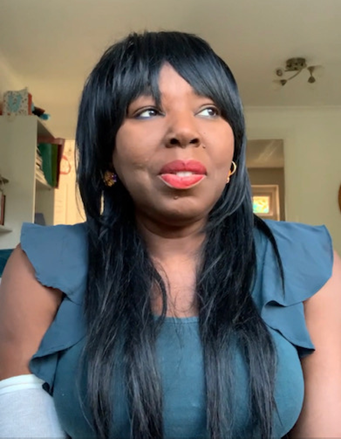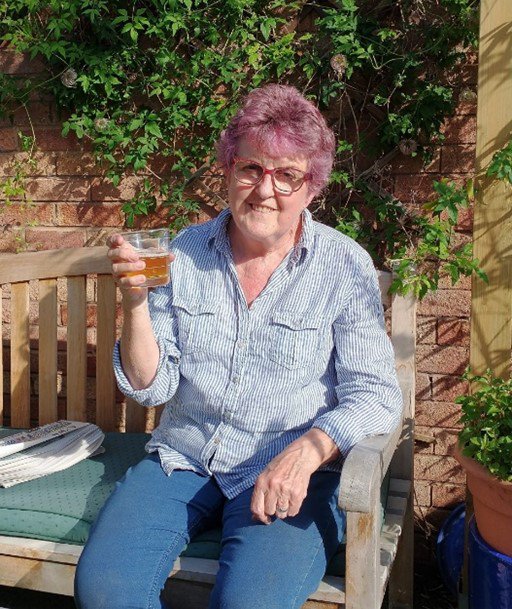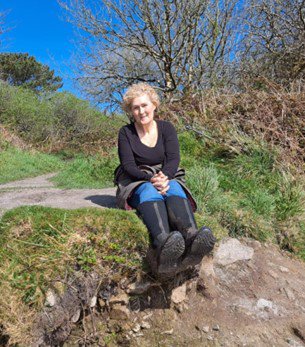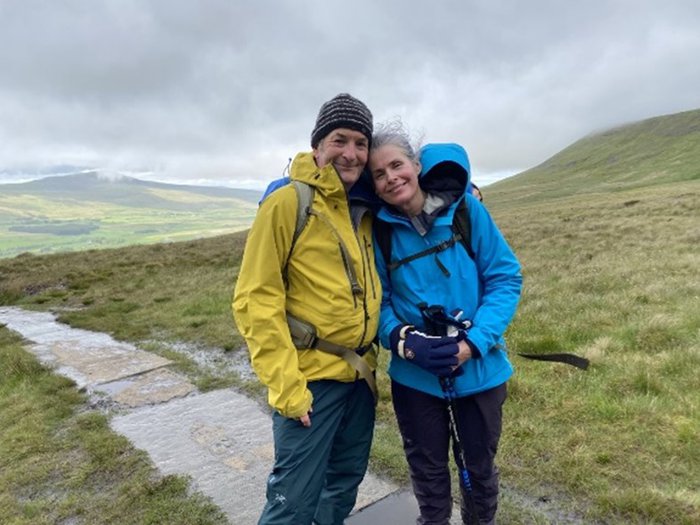Blood cancer and covid: making choices that work for you
We know it's still an uncertain time for the blood cancer community, with many people trying to find the right balance between protecting themselves from the virus and looking after their mental well-being. We asked six people with blood cancer how they're coping, and what's helping them make the choices that are right for them.
Linda J

I have made the decision that despite being immunocompromised, I am not going let my life feel like a prison.
The lockdown was quite something, and coupled with the shorter days and dark winter nights, it did have an impact on my emotional health. When the virus first broke in the news, I experienced aversion and avoidance and judgement from neighbours, due to misinformation around covid risk and ethnicity. My neighbours at that point did not know of my wider health diagnosis, but with medical staff and ambulances coming and going, I know they wondered what it was all about and how it linked to covid.
Masking up every time we went anywhere has been cumbersome. I now choose the plastic see-through visors which I think are more pleasant as you can interact better with people as you can see them smile! I am one of nine siblings, with many grandchildren in the family, and it has been difficult to arrange and attend weddings or social family events. If the sun is shining, I invite my family to sit outside with me under a brolly. If they are in the home, I sit near an open window. They know not to come if they feel unwell. I don’t stay anywhere too long as I simply get too tired. I live with my adult daughter who is 22 and who has just started nursing. She has been a boon of support and encouragement to me.
I have made the decision that despite being immunocompromised, I am not going let my life feel like a prison. You are a long time dead and you have to have a life. I think we have to get used to covid. I understand we are more at risk with our cancer diagnosis, and many of us will not heal as quickly. I have caught Covid previously, after I’d had my first vaccine and luckily my symptoms were very mild. I found that chicken soup (Caribbean style) and Lemsip helped me. My Christian faith has been my greatest help, both during my myeloma diagnosis, and during covid. I am not afraid of death or dying.
For more tips and information around managing risk, head to our webpage here - Coping with the risk of coronavirus.
Pam

My advice is wear a good, protective mask, meet and eat outside, ask those who you meet to test and tell them why it is necessary.
As someone with chronic lymphocytic leukaemia (CLL) and immune thrombocytopenia (ITP), covid has changed my life. I used to visit my family regularly, stay over, have them in my home, and the same with friends. Now we meet outside, no matter what the weather. I feel sad that I am missing out on my two grandsons’ lives. We tried Zoom, but where it works OK with adults, children are not so impressed! I have used Zoom however to continue with my exercise classes, and also my choir. The former works well, but choir is more of a challenge.
Our families and our friends are willing to test before we see them and we meet outside. We’ve had a small, open-sided shelter constructed in our garden which has enabled us to meet more comfortably with local friends.
We used to frequently eat in restaurants and now we don't. Instead, we celebrate special events by ordering in food. We still have our groceries delivered, and I rarely go into town. If I do have to go into any building or shop, I wear a FFP2 mask, and I shop minimally, I go with a list, and I don't browse.
I am very fortunate that I have a very supportive partner whose life has obviously changed too. We have several holidays booked this year, in this country, with various family members. We stay in a separate cottage, take as much food as possible with us to self-cater, and hope the weather is fine!
My partner and I share common interests, so we have been involved in, for example supporting a local park's friends’ group. This has meant we have made new friends and safely met and worked outside. We have a garden and an allotment that keep us busy.
So my advice is wear a good, protective mask, meet and eat outside, ask those who you meet to test and tell them why it is necessary. Get outside whenever you can!
Rebecca

My consultants say they didn't save my life in order for me to feel imprisoned, restricted, reduced. And I don't. This woman is back!
It was extremely tough being in hospital for the 16 weeks of treatment for acute myeloid leukaemia without a single loved one allowed in to visit me because of covid. I couldn't even see my husband and teenage son. Not once. I thought I might die, and that I might never see them again. The pain of thinking I might not see my beautiful son's face once more was unbearable.
Once I got home however, I was in heaven, despite covid. I'm fortunate enough to live in a rural area, and I happen to be an introvert - and so I really didn't mind not seeing anyone. It was a delicious break from dozens of daily interactions with complete strangers in the form of nurses, cleaners, doctors, kitchen staff, dietitians etc, whilst in bed feeling desperately ill. Being tucked up by the fire with my dog and cat, enjoying the peace and quiet, was just what I needed. I soaked it up for months, while regaining my strength with ever-increasing daily walks. I was quite happy with this shielding lark, for the time being.
But I do have some social needs, as do all introverts, and I did need to get on with everyday tasks because my husband works for long periods at sea, so after several conversations with consultants, I eventually felt reassured that I would be likely to be able to deal with this strain of covid which is thought to be milder, and so I bit the bullet, and started getting on with my life.
I see friends outside, or in quiet indoor spaces with my mask on. I go shopping at times, again taking precautions. My son brings friends home, because he needs a life - but they know they shouldn't come over if they have any covid symptoms. I've eaten out at restaurants, usually outside. And I'm going on an overseas holiday soon for a few weeks. I'm a bit nervous about the airport and plane, but I'll take the usual precautions. My consultants say they didn't save my life in order for me to feel imprisoned, restricted, reduced. And I don't. This woman is back!
Don’t be afraid to seek advice and support from members of your healthcare team to help you consider what risks you feel comfortable taking.
Vij
We have to live and continue our life and we deserve to do things that make us happy. I think it’s important to be kind to ourselves, without guilt, pressure or regret.
Living with polycythaemia vera (PV) in the age of Covid for me is being cautious and socially aware of my surroundings. Managing the risk of Covid with the necessity to continue my life, while I have it, doing all the things I enjoy and make me happy.
As time has passed, I’ve seen people’s opinion and thoughts on covid change. With restrictions lifted socially and at work, I feel a greater responsibility for my own welfare and health. Despite what it looks like or how it makes others feel, I still chose to wear my mask in public places and at work. I know my mask helps others more than myself, but I use it as a symbol that covid is still being spread and reminder for me to be cautious and look after and be in control of my own health as best I can.
Covid hasn’t stopped me doing anything in particular, but it has made me more confident to be a bit selfish about what I am comfortable in doing without feeling guilty or resentful. I choose to socialise with people who are aware and accommodating of my anxieties and risk, and go to places where I feel comfortable. When outside my comfort zone, I take an extra lateral flow test on top of testing myself twice a week. I trust the people around me to tell me if they have tested positive or come into contact with anyone who has tested positive and who understand if I keep my distance. I’ve not shielded nor do I feel I need to at the moment, but I will always ask myself, “Is it worth it?” In most cases it is, but I’m independent, strong and confident enough to say no or pass on a situation without feeling the need to explain myself.
After much thought, I have taken all vaccinations available to me and though it doesn’t make me immune, like with all my other medications, I have to have faith it’s going to help along with my behaviour and attitude to keep me safe and provide a level of protection. I also seek comfort that should I catch Covid, there are antiviral and antibody treatments available that I can access should it be necessary.
We have to live and continue our life and we deserve to do things that make us happy. I think it’s important to be kind to ourselves, without guilt, pressure or regret. Your health – physically, mentally and emotionally – matters and it’s important you address all of these as best you can. Seek comfort that you are not alone. There is an army of people feeling just like you, and if you ever need support, a shoulder or ear, they are not far away nor take much effort to find. Take control of the present and have faith in the future. See Covid as a challenge to manage rather than a brick wall impossible to climb over or knock down. If you have the ability to fight and cope with cancer, you have it in you to do the same with Covid.
Remember that if you are eligible for covid treatments, you can still get free covid tests, whether or not you have symptoms.
Peter

Social contact is our biggest risk. But what is life without social contact?
I was diagnosed with chronic lymphocytic leukaemia (CLL) quite by chance. No signs, no symptoms. Just a positive diagnosis replacing a previously clean bill of health. And of course introducing a whole new heap of worry. What will the course of my illness look like? What risks do I now face? How long might I live? Once over the shock, and the realisation that there are no hard and fast answers with CLL, I began to form the view that there was still a life to be lived. Places to go, people to see, goals to achieve, and fun to be had. And then…a month later we all plunged deep into the pandemic.
When we were all locked down the risks seemed manageable. The amazing development of novel vaccines brought hope that maybe there was a way through the new normal. But after 4 jabs I, like so many of us, have not been able to mount a discernible antibody response.
The impact of all of this has led my wife and I to adopt our friend Clare’s concept of a “risk budget”. Social contact is our biggest risk. But what is life without social contact? So, we have to work out what really matters to us, and the level of risk we are willing to bear. We need to see our children and grandkids. We have to spend time with our dear friends. We both hold down jobs we enjoy (and let’s face it we need the money). But we don’t need to go to a crowded pub. We can try new food at home. We can watch football on telly. We drive to places rather than take public transport. It has been a difficult balance to strike, and hard on friends and family. They share a heavy burden of worry that they may carry the illness to us.
For two and a half years our cautious risk budget has worked well. We have learned to adjust. Learned to appreciate our home and our local surroundings so much more. We have both got a little fitter and to enjoy more of an outdoor life. I didn’t think it would or could be possible, but our love for each other has been strengthened by this adversity.
And then last week it happened. Headache. Runny nose. Sore throat. Aches and pains. And two lines on the LFT. This was the moment we had dreaded. All the news, all the publicity, all the science came crashing in. I logged the test, and emailed my consultant. He was back in a flash with advice about how to manage the potential treatment process. He was clear. I should be treated, however mild the symptoms. The process worked smoothly and within 12 hours a course of Paxlovid antiviral treatment was delivered to our door. And 5 days later, after a period of flu like symptoms, I tested negative. I did have something called Paxlovid rebound two days later, and I tested positive again, but a week after that, clear again.
All praise to modern medicine. Paxlovid worked for me. It carries some risk, and clearly is not something to administer lightly. But it offers hope that if we can’t avoid catching Covid, we don’t have to suffer its worst effects. Does it change my risk budget? Not much. But we will see a bit more of our family and friends and feel a little more confident in doing so. And for them, the people who really suffer when their loved ones are ill, there is more hope for a better future.
Get a solid plan in place with your consultant and/or GP for if you were to test positive for Covid. This may offer you reassurance that you’ll get assessed for Covid treatments.
Bob
My family have been very supportive throughout the pandemic, but the emotional impact has been quite marked.
As someone with chronic lymphocytic leukaemia (CLL), living with covid is a problem for me. Even before the pandemic I was inclined to catastrophise, and now I see mortal danger everywhere I go.
My choir kept up a Zoom presence throughout the pandemic, and fortunately, our secretary is a visiting professor in immunological matters at Kings College London. So the choir has a Covid rehearsal protocol that requires LFT testing once a week. This is under pressure though, now that people are having to buy tests; several members of the choir are openly hostile. Even members who are not openly hostile complain about not singing cheek-by-jowl in rehearsal; and all bets are off on performance day. I also go to outside concerts, very rarely (though I have been to two in the last month - one of which was in the open air).
I keep up Tai Chi lessons once a week via Zoom and once a week in the open air. I continue to wear a face-mask in crowded situations, though I'm aware that it is a protective more than a defensive measure.
My family have been very supportive throughout the pandemic, but the emotional impact has been quite marked. I'm not a very touchy-feely person, and Covid has given me an excuse for becoming even more distant.
Coping mentally with all the worry is challenging. Sometimes talking to someone who understands can help, so feel free to join our online community forum
Further Support:
Need to talk? We’re here for you if you’re looking for support or information around blood cancer and covid-19 - Blood cancer information and support by phone and email | Blood Cancer UK
Read our blood cancer and covid webpages - Coronavirus (COVID-19) information and support | Blood Cancer UK
